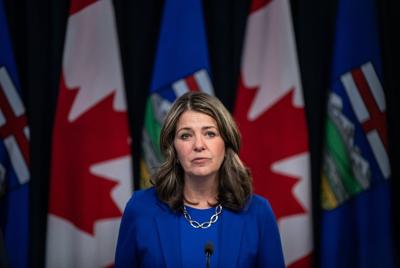EDMONTON - The Alberta government says it will maintain a frozen industrial carbon tax price for 2026, putting the province at odds with federal rules.
Premier Danielle Smith announced the freeze in May, saying Alberta’s price would stay at $95 per tonne of emissions for an indefinite period of time.
Alberta was set to increase the price to $110 per tonne starting next year ŌĆö in line with the federal schedule ŌĆö but now says it’s keeping the freeze in place for 2026.
“WeŌĆÖre giving industry the certainty, stability and economic relief they deserve,” Environment Minister Rebecca Schulz’s press secretary said in a statement.
Canada’s industrial carbon tax program permits provinces to implement their own program as long as the provincial policy keeps up with prices set by Ottawa. The federal schedule currently sees the price rising to $170 per tonne by 2030.
The federal backstop rate is supposed to be implemented if provinces fall behind, but it remains to be seen if Prime Minister Mark Carney would enforce the higher price — especially since he hasn’t taken action against Saskatchewan, which dropped its industrial carbon price completely earlier this year.
Experts, like University of Calgary energy law professor Martin Olszynski, say Alberta’s move isn’t illegal, but puts the onus on Carney to act.
“The federal regime is essentially a toggle, so they either impose that additional bit of price... to get to the level they say is appropriate or they don’t,” Olszynski said in an email.┬Ā
Environmental groups have called on Carney to enforce the federal rate on Alberta come next year.
But Smith says that she’s working with Carney to resolve concerns she has about the industrial carbon scheme, just as they continue to talk to resolve difference over the federal greenhouse gas emissions cap.
“It’s one of the things we’re talking about,” Smith told reporters in Calgary Wednesday. “We understand the conversation around having a progressively higher rate ... but I think (Carney) also understands that some of the proposals to get there by 2030 would have been job killing and project killing.
“We knew that we needed to send a bit of a signal to the prime minister and to the market that at the moment we think ($95) is what the market will bear,” she said.
“Over time there may be some ability for it to increase without it impacting these projects, and that’s the conversation that we’re having with the federal government right now.”
Carney’s office didn’t immediately respond to questions about if he would enforce the higher price. Federal Environment Minister Julie Dabrusin’s office didn’t give a definitive answer but said in a statement that Ottawa will collaborate with Alberta on a new path forward.
“We remain ready to collaborate with Alberta on a path that supports workers, strengthens competitiveness, and seizes the opportunities of the clean economy while upholding the rules that protect all Canadians,ŌĆØ the statement reads.
Her office added that it still thinks industrial carbon pricing is an effective policy tool ŌĆö something Smith also acknowledged Wednesday.
“I don’t want to give up that lever altogether and I don’t think that the industry proponents who are invested in (emission reducing) technologies do either, but we have to make sure that the price is set correctly,” Smith said.
Stephen Legault, a senior manager for advocacy group Environmental Defence, said neither Alberta nor Ottawa are acting as though they actually think the policy is effective.
“I think it would be absolutely astonishing if the federal government under Mark Carney enforces the backstop,” said Legault, adding that Carney seems to be embarking on “the systematic rollback of climate change efforts.”
This report by The Canadian Press was first published Sept. 17, 2025.



























To join the conversation set a first and last name in your user profile.
Sign in or register for free to join the Conversation